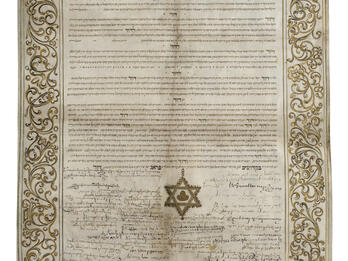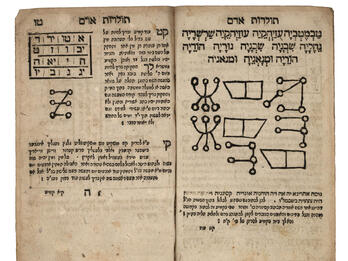The Current Expenses of Jerusalem
The current expenses of the city of Jerusalem, may it be speedily rebuilt and reestablished in our days, are close to five thousand kuruş per annum. This is not the case for Safed and Hebron. In the case of Hebron, two thousand kuruş are enough, perhaps even less than that, for if its debts were lightened, one thousand would be sufficient: five hundred for the costs of the city and five hundred to support ten scholars who can devote themselves entirely to the study of Torah. In Safed, may it be speedily rebuilt and reestablished in our days, two thousand are not enough for this purpose. However, it is only in Jerusalem that the community is obligated to establish a Torah presence, whereas elsewhere it is enough to have a study hall of scholars whose job it is to learn Torah. Thus, two thousand is sufficient for Safed, which comes to a total of five thousand kuruş.
It seems to me that it is only for Jerusalem that the entire diaspora is obligated to provide active assistance and support its settlement as best they can. However, in our many sins the gentiles make us look bad in this regard, as they consistently provide the city with aid. These are the yearly expenses of the gentiles, in the current year 5452 [1691–1692]:
The church authorities of the priests and clerics of Jerusalem are supported by individual charitable donations from all over Europe, especially Spain. Every year, two messengers come from Spain, each bringing a promissory note for twenty-five thousand kuruş, which means that fifty thousand kuruş arrive just from Spain. With the addition of some ten thousand from Venice and other places, they receive roughly seventy thousand kuruş. These are the current expenses for their church [i.e., of the Franks] in Jerusalem and Bethlehem in Judea and the surrounding region all the way to Constantinople.
The Armenians, for their part, are given forty thousand kuruş every year, while the Greeks receive thirty thousand kuruş, more or less, per annum. Now for Israel, five thousand kuruş would be enough for the taxes, while a further two or three thousand would cover the upkeep of Torah centers: a total of eight thousand kuruş, up to ten thousand in a time of hardships. This is for the three areas of the land of Israel for which the entire diaspora bears responsibility, especially the settlement of Jerusalem. I will grant that Safed and Hebron are optional, but Jerusalem is a duty, as it is stated: For I will restore health to you, and I will heal you of your wounds, says the Lord; because they have called you an outcast: She is Zion, there is none who cares for her (Jeremiah 30:17). This verse implies that one must always care for her [b. Rosh Ha-shanah 30a].
I write down here what I was told by the gentile priests of the Armenian church: their bishop was called Eghiazar the Patriarchate, who died in 1692 in the land of Armenia, near Mount Ararat. He served as the patriarchate here in Jerusalem for several years and he built many buildings in the city and spent more than one hundred thousand kuruş on these projects, as is well known. His constructions can be seen to this day. He related to me, and indeed showed me manuscripts in Assyrian and Hebrew to the following effect. He told me that there is a convent on Mount Sinai, where they found in a cave a large a leaden cylinder with Hebrew letters, containing these verses from Jeremiah (30:13): None deems of your wound that it may be bound up; you have no healing medicines, etc. continuing to chapter 35.
A commentary on these verses is written in Assyrian, but no one there could decipher it properly. They searched throughout the entire world for someone who knows how to read and explain this text, and they discovered that it states as follows: At the end of days the descendants of Shem will seek out Jerusalem from all parts of the world, and they will establish seventy men from among them, with one of them ascending there each and every year. This they will do from Europe and Asia, and from their lands they will set up an academy in Jerusalem of seventy scholars, with one man appointed over them. In times of trouble the Holy One, blessed be He, will bring to the land of Israel many homeowners who will dwell there in the land, and they will settle the land, and all those living there will be exempt from all taxes, as the members of the diaspora will accept their taxes upon themselves. The one who ascends to the land of Israel once every seventy years will have the power and resources from his brethren in the exile of Rome and the surrounding area to pay for most of their expenses, both for taxes and for their living in a palace, as it is stated: and the city shall be built upon its own mound, and the palace shall be inhabited in its rightful place (Jeremiah 30:18), and it has been explained that this palace is the establishment of a meeting place for Torah scholars. This is exactly as I stated and alluded to above, and thus, the residents of the land of Israel will be exempt from taxes.
Credits
Published in: The Posen Library of Jewish Culture and Civilization, vol. 5.




